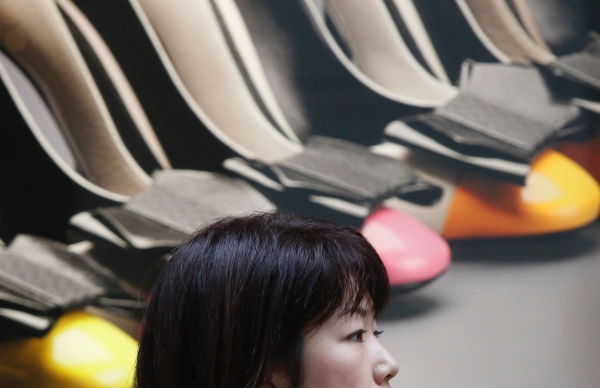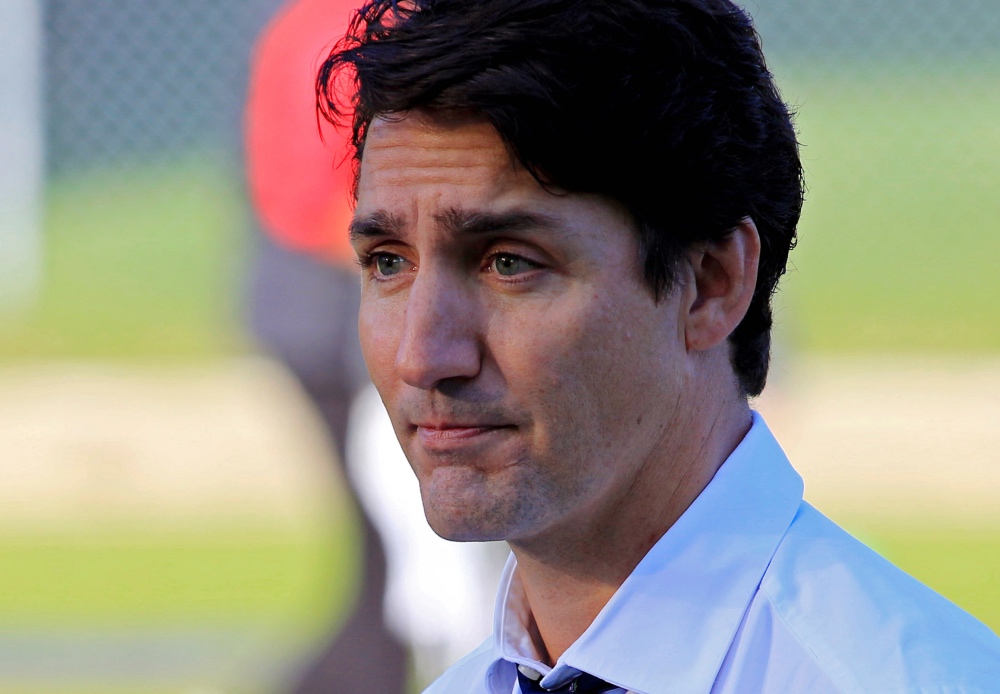London/Vancouver, Canada
Thomson Reuters Foundation
Girls worldwide hope to become leaders, but they expect to face sexism and harassment when they get there, a global child rights organisation said in a report released on Tuesday.
More than nine in 10 girls and young women said female bosses could expect unwanted physical contact and to be treated unfairly, according to a survey of nearly 10,000 across 19 countries by Plan International.

A woman walks past an advertisement for high heel shoes outside a luxury shop at Ginza shopping street in Tokyo, on 28th August, 2014. PICTURE: Reuters/Yuya Shino/file photo
“For girls and women globally, being a leader means discrimination and harassment,” said the organisation’s chief executive, Anne-Birgitte Albrectsen.
“The findings show, if something isn’t done urgently, generations of girls will continue missing out on their ambition to become leaders and to have an influence on the areas of society, work, politics, community and family life.”
Researchers surveyed girls aged from 15 to 24 in countries including the United States, Canada, Denmark, India, Japan, Peru, South Sudan, and Uganda for the study, and also carried out several hundred in-depth interviews.
More than three quarters of those surveyed said they aspired to become a leader, even though most thought their gender would make it harder for them to succeed and gain respect.
Young women who had experience of taking a leadership role were even more likely to expect gender discrimination than those who have no experience of leading, according to the report released at the Women Deliver 2019 conference in Vancouver.
“In Japan, there is still prejudice and men are more likely to become a leader and reach higher rank,” said one girl interviewed by the charity’s researchers.
“Everyone should be eligible to pursue higher rank, but if it’s a girl who has a dream or ambition to become a leader, people start criticising.”
The report called for action to cultivate future female leaders in homes, schools, and communities and to challenge stereotypes of what it means to be a leader that can disadvantage girls.
Meanwhile, on Monday, Canadian Prime Minister Justin Trudeau said gender equality is “under attack” amid hatred, misogyny and politicians campaigning to undo women’s rights.
Speaking at the launch of a global conference on women’s issues, Trudeau, a self-avowed feminist who appointed the first gender-balanced cabinet, said progress in women’s rights is backsliding in the face of taunts and hostility that travel on social media and seep into public discourse.

Canadian Prime Minister Justin Trudeau speaks during the opening of the Women Deliver 2019 Conference at the Vancouver Convention Centre in Vancouver, British Columbia, Canada, on 3rd June. PICTURE: Reuters/Lindsey Wasson
Some 8,000 delegates from more than 165 countries are attending Women Deliver in Vancouver, the world’s largest gender equality conference, which will address topics from women’s political empowerment to education and employment.
The conference was opened by a procession of indigenous men and women, clad in traditional clothing, some wearing red in memory of murdered and missing girls and women.
Trudeau hailed as a “significant step toward justice” a Canadian government finding on Monday that the deaths of more than 1,000 aboriginal girls and women in recent decades was a national genocide.
The report, from an inquiry launched by Trudeau’s government in 2016, blamed the violence on long-standing discrimination against indigenous people and Canada’s failure to protect them.
“For too long, indigenous women and girls have experienced violence at a rate that is staggering when compared to non-indigenous women,” Trudeau said.
The report made scores of recommendations, and Trudeau vowed to develop and implement a national action plan to prevent future violence.
He told delegates that women around the world were battling misogyny, racism and hatred.
“Gender equality is under attack,” he said. “Individuals and interest groups are trying to roll back women’s rights.
“Politicians are giving into the pressure, shamefully campaigning to undo women’s hard-won victories. That’s a daunting reality.”
The inquiry into the missing and murdered women was a painful process that heard testimony from thousands of witnesses, including hundreds of family members of victims.
Citing colonial violence, racism, sexism and more, the report said many indigenous people have grown up normalized to violence, while Canadian society showed “an appalling apathy” to addressing the issue.
“The National Inquiry into Missing and Murdered Indigenous Women and Girls finds that this amounts to genocide,” it said.






